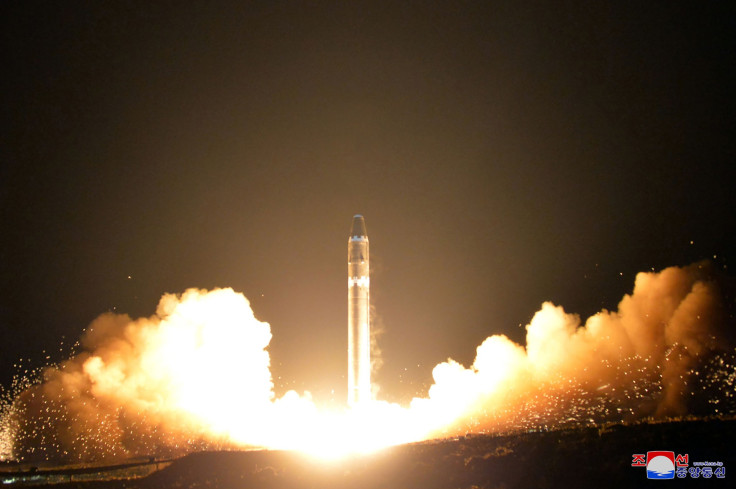North Korea Will Talk With US After Advances In ICBM Technology: Report

North Korea might look towards engaging in diplomatic talks with the U.S. after the South Asian country does a successful test of the re-entry of its intercontinental ballistic missile (ICBM), as stated by a South Korean think tank Thursday.
According to a report by Yonhap News Agency, the Institute of Foreign Affairs and National Security (IFANS) stated that North Korea is expected to launch an ICBM named Hwasong -15 at least once in 2018 in a bid to perfect its nuclear capabilities of a missile which they claimed can reach the U.S. mainland.
In a 2018 prediction on international affairs, IFANS said: “If the North launches the missile on a standard trajectory and its re-entry technology is confirmed, there is a high possibility that North Korea will seek disarmament talks with the U.S. on its proclaimed nuclear state status.”
According to a report by the New York Times in November, North Korea fired an ICBM which flew higher and longer than any other missile before. The report stated that the missile launch was a reply to President Donald Trump putting North Korea back on the state sponsors of terrorism list.
With regards to the missile launch, Defense Secretary Jim Mattis reportedly said: “It went higher, frankly than any previous shot they’ve taken.”
He added, “The bottom line is, it’s a continued effort to build a threat — a ballistic missile threat that endangers world peace, regional peace, and certainly, the United States.”
Trump also reacted to the incident and said, “It is a situation that we will handle.”
The report further stated that the Hwasong-15 ICBM missile was launched from the northeastern side of Pyongyang. It traveled 600 miles to the east and ultimately landed in the Sea of Japan. North Korea reportedly stated that the missile test was conducted successfully and that it could deliver nuclear warheads at any location near the U.S.
In another report by the New York Times, North Korea, right after the successful ICBM missile test. claimed that it had become a fully capable nuclear state. The report also said that North Korea conveyed a clear message that it will never abandon its nuclear ambitions by saying that it had “finally realized the great historic cause of completing the state nuclear force.”
However, according to the report by Yonhap News Agency, experts stated that North Korea might still be far away from a successful re-entry technology for its ICBM. The technology reportedly allows a warhead to withstand high heat and pressure during its passage through the Earth’s atmosphere.
IFANS stated that South Korea and the U.S. would not want to engage in disarmament talks with North Korea because holding such a negotiation would mean that they recognized North Korea as a nuclear state.
However, IFANS also said, “But if the North takes a course for negotiations, South Korea and the U.S. cannot easily shun away from a dialogue offer.”
They added, “This will make the allies seriously think about what to do.”
The think tank stated that North Korean leader Kim Jong-un could also choose for a “limited war” in a bid to consolidate the nation’s internal solidarity if by any chance the country faces a harsh crisis.
IFANS, with regards to the possibility of a war in the Korea Peninsula, said that during a time of such high tensions, the chance of an “accidental” conflict shouldn't be taken out of contention.
© Copyright IBTimes 2025. All rights reserved.






















